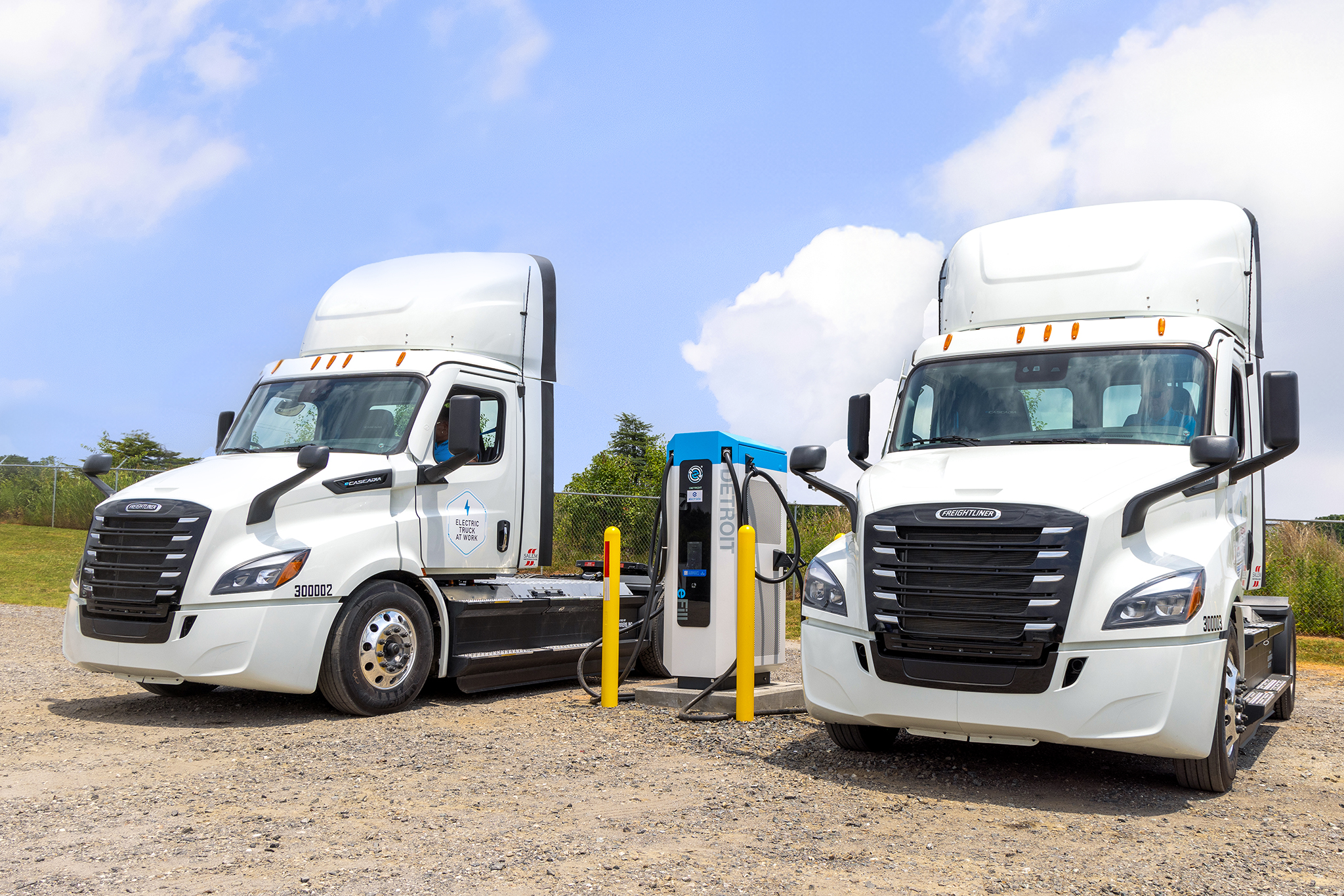- Discover the Future of Green Logistics: Explore how Daimler Truck North America’s latest electrification initiative with Salem Carriers is setting new standards in sustainable logistics operations.
- Charging into Innovation: Dive into the details of the first-ever Charging-as-a-Service (CaaS) project launched by Daimler, transforming energy management and infrastructure for electric fleets.
- Powering Up with Advanced Energy Solutions: Learn how the integration of the Duke Energy/Electrada mobility microgrid supports Daimler Logistics Electrification by providing stable, renewable energy for next-generation logistics.
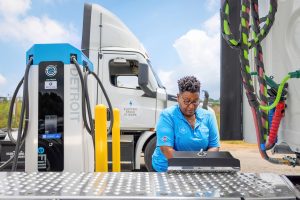
Charging into the future with Daimler’s first-ever CaaS project deployment.
Daimler Truck North America (DTNA) has taken a significant step forward with its latest initiative, Daimler logistics electrification, at the Salem Carriers hub near Charlotte, N.C. This pioneering effort not only continues the electrification of DTNA’s inbound logistics operations but also sets a new standard in sustainable supply chain practices. Learn more about Daimler Truck North America’s initiatives and innovations at our dedicated DTNA page.
Daimler Logistics Electrification: Pioneering Sustainable Transportation
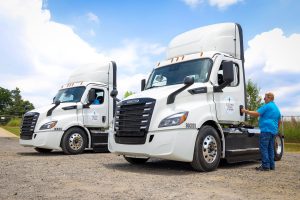
Freightliner eCascadia trucks: Leading the charge in electric freight mobility.
Daimler Truck North America’s (DTNA) collaboration with Salem Carriers exemplifies a significant leap in integrating zero-emission vehicles into their logistics operations. This initiative, involving Daimler Truck Financial Services (DTFS) and Electrada, introduces a comprehensive Charging-as-a-Service (CaaS) solution, designed to modernize energy infrastructure and minimize carbon footprints across the board, setting a new benchmark in sustainable supply chain management. For a deeper understanding of how Charging Stations are needed to transform logistics, explore our dedicated section.
Pioneering the Charging-as-a-Service Model
Comprehensive CaaS Deployment
The collaboration with Electrada introduces DTNA’s first-ever CaaS project deployment, a model that consolidates the development, operation, and maintenance of charging infrastructure at a fixed, predictable cost. This includes energy management and operation of fleet charging facilities at Salem’s Statesville depot and the innovative Duke Energy/Electrada mobility microgrid in Mt. Holly, N.C. This strategic partnership underscores the shift towards service-level agreement-backed CaaS solutions, recognized as the most reliable approach for depot electrification in critical transport operations.
Enjoying our insights?
Subscribe to our newsletter to keep up with the latest industry trends and developments.
Stay Informed
To learn more about Partnerships that are pioneering sustainability in transportation, check out this page.
Integrating Advanced Energy Solutions
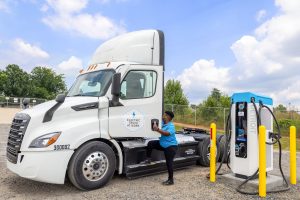
The Duke Energy/Electrada mobility microgrid: Powering logistics with renewable energy.
Adjacent to DTNA’s eastern U.S. manufacturing facility, the Duke Energy/Electrada mobility microgrid, which features solar generation and stationary energy storage, ensures operational efficiency and supports the national push towards decarbonization. This integration is part of a broader strategy to incorporate renewable energy solutions that bolster the reliability of the electric supply, aiming to transform logistical operations into eco-friendly endeavors. For additional insights into how Renewables are integrated into logistics operations, follow this link.
Benefits of Electrification in Logistics
Electrifying logistics operations diminishes reliance on fossil fuels, cuts greenhouse gas emissions, and supports corporate sustainability pledges. DTNA’s initiative reflects a larger trend within the industry to adopt more environmentally friendly practices, which includes the deployment of Freightliner eCascadia vehicles for daily routes, further proving the viability and reliability of electric trucks in heavy-duty operations. Stay updated on Electric Trucks and their impact on reducing emissions, visit this link.
Validation of DTNA’s Electric Solutions
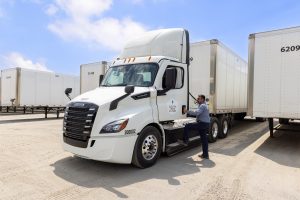
Pioneering a new standard in sustainable supply chain practices.
Using DTNA’s electric Freightliner trucks and high-performance charging infrastructure provides a solid proof of concept that substantiates the reliability and efficiency of electric vehicles in commercial logistics settings. This initiative serves as a critical validation point to the market, demonstrating DTNA’s commitment to being a customer of its own innovative solutions.
Future Outlook and Expansion
Looking forward, DTNA aims to extend its electrification efforts, planning to integrate electric vehicles and renewable energy solutions across more of its operations, thus setting a benchmark for the industry. This includes goals to achieve CO₂-neutral production at all its truck manufacturing plants by 2025, aligning with its broader strategy to ensure that all new products and services from direct suppliers in Europe, the United States, and Japan are carbon neutral by 2039. Explore the latest trends and strategies underpinning Sustainability in the trucking industry, click here.
Stakeholder and Community Impact
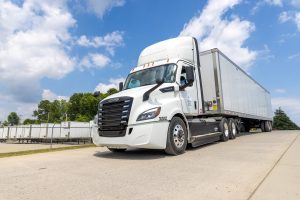
Achieving CO₂-neutral production by 2025—DTNA is committed to real change.
The collaborative effort between DTNA, Salem Carriers, and Electrada not only fosters innovation within the logistics sector but also contributes positively to local communities by promoting cleaner transportation solutions. This partnership illustrates how integrated efforts can help scale electric vehicle integration into logistics services, significantly enhancing the socio-economic and environmental landscape of the regions involved. Understand the strategies being employed to achieve Zero Emissions in manufacturing, explore this link.
Key Developments in Daimler’s Electrification Initiative
Milestones in Sustainable Logistics
- Initial Deployment of Electric Trucks: Salem Carriers began utilizing DTNA’s Freightliner eCascadia trucks for daily inbound logistics, marking a significant step in reducing carbon emissions and enhancing operational efficiency. (Daimler Truck North America)
- Innovative Charging Infrastructure: The implementation of a comprehensive CaaS solution with Electrada at the Salem depot, including development, operation, and maintenance of charging stations. (Automotive Purchasing and Supply Chain)
- Renewable Energy Integration: The use of the Duke Energy/Electrada mobility microgrid next to DTNA’s manufacturing facility ensures a continuous supply of solar-generated electricity, showcasing a leading-edge application of renewable energy in commercial transport. (electrive.com)
- Expansion Plans: DTNA outlines future goals for electrification across its logistics network, aiming for CO₂-neutral production in all truck manufacturing plants by 2025 and complete carbon neutrality from direct suppliers by 2039. (Charged EVs)
More News on DTNA
- Sysco Orders 800 Electric Trucks – This article discusses Sysco’s significant order of 800 electric Freightliner eCascadia trucks from DTNA, a major move towards reducing carbon emissions. This aligns well with themes of sustainability and electrification in transportation. You can read more about it here.
- Daimler Unveiling Electric Trucks – This article covers DTNA’s unveiling of new electric Class 8 and medium-duty trucks, contributing to the ongoing discussion about the future of electric mobility in the trucking industry. More details are available here.
- Daimler Plans Recharging Network – DTNA is planning to develop a nationwide high-performance charging network for medium and heavy-duty battery-electric and hydrogen fuel cell trucks. This initiative complements the discussion on infrastructure developments needed for electric trucks. Further information can be found here.

